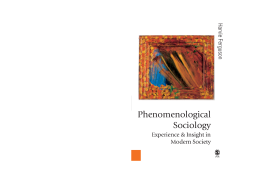
Additional Information
Book Details
Abstract
This innovative and thought-provoking book argues that phenomenology was the most significant, wide-ranging and influential philosophy to emerge in the twentieth century. The social character of phenomenology is explored in its relation to the concern in twentieth century sociology with questions of modern experience. By reading phenomenology sociologically and sociology phenomenologically, this book reconstructs a phenomenological sociology of modern experience. Erudite and assured, this book opens up a series of new questions for contemporary social theory that theorists and students of theory can ill-afford to ignore. The text contains a treasure trove of insights and propositions that will stimulate debate and research in both sociology and philosophy.
Table of Contents
| Section Title | Page | Action | Price |
|---|---|---|---|
| Introduction | |||
| 1. Contexts | |||
| The case-study countries compared | |||
| The case-study campaigns | |||
| 2. Building an alliance | |||
| Overview; History; Leadership; Membership; Decision-making; Trust; Strengths; Research; Funding; Summary; Key points | |||
| 3. Developing a strategy | |||
| Overview; Starting from here; Identifying the problem; Defining a solution; Targets; Audiences; Actions; Timing; Summary; Key points | |||
| 4. Incorporating gender equality | |||
| Overview; Women and men: changing power relations; Workers; Women's-rights organisations; Gender equality in the alliances; Summary; Key points | |||
| 5. Using the media | |||
| Overview; The media; Press releases; Press conferences; Events; Visual images; Cultivating links with journalists; Do it yourself; Appropriate media; Summary; Key points | |||
| 6. Developing policy | |||
| Overview; Research; Discussion; Publication; International; Summary; Key points | |||
| Conclusion |
